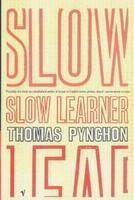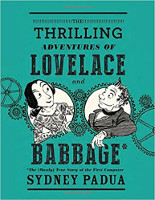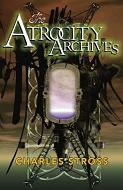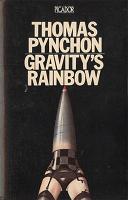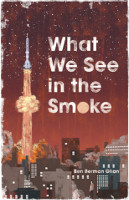 They say you shouldn't judge a book by its cover, and I guess they're right, even if covers frequently are following an optical/design code indicating what's inside. Because we Do choose books by their covers; or at least I do. So, this is one I picked up for its cover, because it put me in the mental frame of things I'd read in the past, and loved.
They say you shouldn't judge a book by its cover, and I guess they're right, even if covers frequently are following an optical/design code indicating what's inside. Because we Do choose books by their covers; or at least I do. So, this is one I picked up for its cover, because it put me in the mental frame of things I'd read in the past, and loved.
And you know what? I greatly enjoyed that one, too, after a few hard-to love initial pages.
Ben Berman Ghan is a Canadian author, editor, and MA student; with now 2 novels (and next year a non-fiction book) plus loads of short fiction and non-fiction articles to his name. His first novel, Wychman Road, is out of print, and next year's release is called Bruce Meyer: Essays on his Work.
What We See in the Smoke starts in realism with a social undertone, and heads from there into the future – all parts set in Toronto, even if you wouldn't recognise it at times if it didn't declare itself to be so!
But to start at the beginning – this is not a straight up story, but what I normally would term a patchwork novel, ie a collection of short stories which, whilst independent in actual topic and story arc, tell a larger story in combination.
He himself terms the book a fix-up novel, as he re-wrote the individual pieces, previously unconnected stories, to refer to each other and tie them together into some kind of single narrative (I don't think they would have created a larger picture otherwise). But terminology aside, this is a collection of short stories, in 3 larger parts of 5 or 6 chapters/stories each: These Memories of Us (2016-2026), These Violent Machines (2040-2280), and An Uncertain and Distant World (2280-3036). But if this sounds all very Accelerando to you then I have to tell you that the book at hand is a much looser collection of impressions.
But, before all that, there is a superfluous preface where the author explains the book, his approach, the genres involved as he sees them, the meaning of the various pieces, etc.
And I have to tell you (and him!): Just don't.
Some of this might have made an ok post-script, and some is entirely not needed.
Skip it, I would recommend.
Then we get long acknowledgments, and a Pratchett quote concerning memory, and the changeability of the world, to send us on our way into the actual stories.
This continues – every story start with a quote, either from a classic, both SF and literary (he studies English Literatures of Modernity, which might have something to do with this).
But let me give you a taste of what's in the stories, just for the first 5.
Chapter 1: Stranger Bedfellows
This follows a gay bookseller, in an old market which is earmarked to be re-developed/gentrified, and who refuses to sell up. We witness an escalating series of threads, attacks, intimidations, interspersed with relationships, inner life, and some fascinating non-sequiturs. Somewhat claustrophobic, and inwards-facing.
Chapter 2: Planet 58
Here the central protagonist is a cycle courier with Mental Health issues and a Shakespeare fixation (and a theory that of 58 planets, each of which have their own version of Shakespeare's plays). This is bleak, but also has glimmers of hope, and I rather enjoyed it
Chapter 3: Tenants
Told through the eyes (so to say) of a tenement building, observing its inhabitants, their loneliness and despair, without being able to help. Again claustrophobic, and inwards-facing, and again with a hopeful outlook.
Chapter 4: A Carnival World
The story of a Jewish inventor, and of the conflict between the Military/Industrial complex and the usage of technology for peace. The son of the inventor, kept away from the family fortune due to Mental Health issues, tracks down the murderer of his father. This displays an interesting contrast of helplessness vs target driven work when the ghost of hid dead father holds and guides the protagonist's hand. All told as internals – fascinating and touching.
Chapter 5: A Time-loop Tango
Depressing. Oppressive. A turn-off, on purpose? This is all part of a standard trope, of course – the protagonist is going through repeated loops of his life, knowing what is to come, but unable to make any major changes – and trying to work his way out of it through small ones instead.
I'm not gonna spoil more, though – but be assured that the middle third definitely ups the quality of stories and writing, with more engaging and believable characterisation (even for far-future AIs!), and the stories, by dint of moving off into the future, becoming more SF-nal. Which, if SF is not the purpose but purely incidental, as he explains in his ill-advised prelude, then maybe he should continue writing SF – freeing himself from contemporary strictures seems to do his story-telling much good!
But even without providing a blow-by-blow run-through of the stories, here are a few highlights.
So we see a world where we have mastered the growing of human tissue and organs in animals, leading, in classic human free-market style, to a blooming black market in human-grown human tissue. For consumption. Which does not help the dearth of organs for transplantation, or the protagonist's quest to obtain an (unaffordable) organ to save his child's life.
We see a man in love with an Android singer, trying to make her more perfect, and more human at the same time. Bit of a contradiction, if you ask me, but love and obsession move in strange ways.
And, special mention, we have the story Dreaming Darkly, set in a world where your dreams belong to others, where people don't dream anymore (chemically induced, with all the mental and physical damage this entails). Chock-full of IP, stores of belonging dreams, new types of crime, Monitors killing offenders dreaming unlicensed dreams, a resistance trying to restore human belief in free dreams...
“Dreams had within any Google-Appartment are the property of Google Inc.” Yup, indeed. A stand-out.
There are weaknesses here, too, though – for example, the plotting frequently struck me as transparent and quite simplistic, straight-forward. The same applies to the tropes he uses – they are frequently not all that unusual or special, or used in unusual ways or combinations. Yes, he deals with them well, does them justice, even if he rarely brings anything new to the table. What sets them apart here is that they are centred on Toronto, and are loosely linked, across very different styles, approaches, and story types.
One thing which I noticed was that somehow many more stories were ending in despair or dissolution, are fading to black, than there are which are projecting hope for a (better) future. Somehow the ones fading to white, with a more optimistic ending, worked better for me here. Which is somewhat surprising, if you know my outlook on life, and the future of humanity...
But the book is titled What We See in the Smoke; and this definitely was the smoke of destruction, and what we see are images of decay – the future proofs not to be what it was hoped to!
The elements which link stories feel frequently slight and inessential, propped on to glue stories together (which they are, by the author's own description). Yes, it ties the book together, but this didn't give me terribly much, I suspect this might just as well have worked as a collection of short stories. Although, some of the cross-links in the stories were rather neat, and put me in a frame of mind like RA Wilson's Illuminatus - “I'm sitting in the crowd twenty years before I was born on a campus at the outskirts of the city”.
“I'm living in a half-remembered account of memory told to me by an old man chose place I've taken”.
The author uses both foreshadowing the obvious to a borderline-annoying level, and reversals of expected developments in the final paragraphs – sometimes both, wilfully misleading the reader!
Overall an interesting and unusual collection/novel, and one I can whole-heartedly recommend!
More Ben Berman Ghan
Title: What We See in the Smoke
Author: Ben Berman Ghan
Reviewer: Markus
Reviewer URL: http://thierstein.net
Publisher: Crowsnest Books
Publisher URL: http://www.crowsnestbooks.com
Publication Date: Jun 2019
Review Date: 190719
Pages: 272
Format: ePub
Topic: Patchwork Novel
Topic: Futurism
Thanks to the publisher for the review copy.





